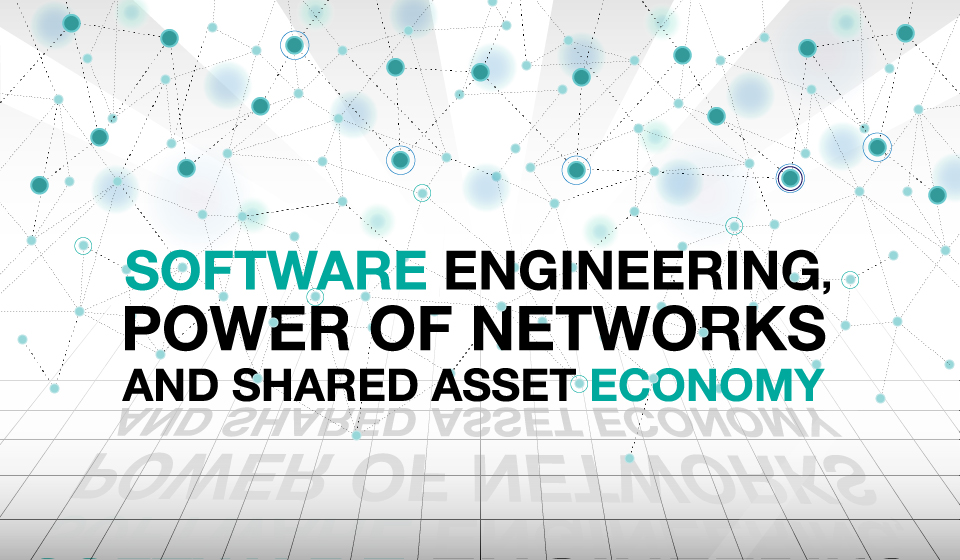
It might be surprising to know that my colleague Abdul Haseeb, software engineer, developed core components of Overbond platform in just three months — a remarkably short time in the software development world. While I think Abdul is undoubtedly an expert coder, his ability to code at such an astonishing rate depended on a little help from today’s powerful networks and technology. In our 2016 shared asset economy, Abdul was able to leverage the work, code, and knowledge of others before him to create a platform that is this robust, that quickly.
Abdul’s ability to code a platform like Overbond is an example of how far the coding world has come, and how the networked economy is working to make innovation faster and easier. “We couldn’t have done that in 2001,” he says. “It’s not that the coding part has gotten infinitely more efficient, it’s the placement of that code in the network.” By placing a powerful code in the hands of a vast network, also known as ‘open-sourcing it’, the code itself becomes infinitely more powerful, and moves from being a valuable singular product to become a channel itself through which innovation and value for new products can be created.
Before open-source code became as large as it is today, fifteen years ago, a program was only as good as its code, and tended to exist in a more or less one-to-one relationship with the user. As a result, the power of the code was limited. Today, however, software engineering has two advantages: the first is faster equipment; computers and network connectivity today can execute functions exponentially faster and more efficiently than a decade and a half ago. But the second is that what those computers are doing has changed: now in 2016, they can simultaneously draw from a vast universe of open-source code libraries available through complex networks of users. “Five lines of code today can do what thousands did 15 years ago,” says Abdul.
Moreover, Abdul’s code is able to access half a century of coding knowledge, and built exponentially on it. If every year the hypothetical knowledge output of all coders in the world is as large as the sum of everything that came before it, then the next year, the output will be another exponent larger — this principle is at the core of the accelerating advancement of coding knowledge and technology, resulting in software start up revolution we are all witnessing in last few years, and is what Abdul leveraged to construct a platform like Overbond.
Abdul, like many other coders working in open-source coding environments, was not only using network to access and utilize coding knowledge through open-source code libraries — he also utilized the secure network to place his code for users to access applying highest encryption standards. Through this, secure cloud networking allows for instantaneous global reach to customer base — something that fifteen years ago would have been an extremely expensive marketing and sales endeavor. For Overbond, the bond origination industry creates value that goes beyond the platform itself. In the shared asset economy, the platform is only the primer for the value that the users give it. Just as Uber’s technology enables a vast transportation network (and it is the network which is most valuable), Overbond taps into a network of bond dealers, issuers, and treasurers to create not only a product, but an entire value-laden network that is enabled by this product. According to PwC study from February 2016, most powerful platforms are no longer those that do something for you, but rather those that connect you. This, says PwC, “is fintech’s most powerful weapon”.
The salient point here is that Abdul’s code running Overbond platform, is the code that leverages the new realities of the shared asset economy. 57% of people agreed, in a PwC poll, that “access is the new ownership” — meaning, in this case, that rather than create a product that people can own, the new economy demands that you create a product that people can access. This not only allows for coders like Abdul to create code that is more powerful when placed in the hands of many rather than a few, or a product that is more powerful when placed into the value-laden network of users, but it creates an asset-light business model.
With the power of networks, shared asset economy business models and ever so fast software engineering capabilities we are witnessing unprecedented amount of change and innovation at astonishing speeds.
About Vuk Magdelinic:
Before founding Overbond, Vuk’s career spans over 10 years in capital markets and technology. As PwC Risk and Regulatory consulting manager Vuk led large digital transformation programs at Deutsche Bank and BNY Mellon in New York City. Prior to that he worked at CIBC Fixed Income trading floor in Toronto in structured products origination capacity. Vuk has collaborated on numerous publications addressing key trends in fintech innovation. Vuk holds electrical engineering degree from University of Toronto, MBA from Ivey school of business and is an avid abstract painter.


